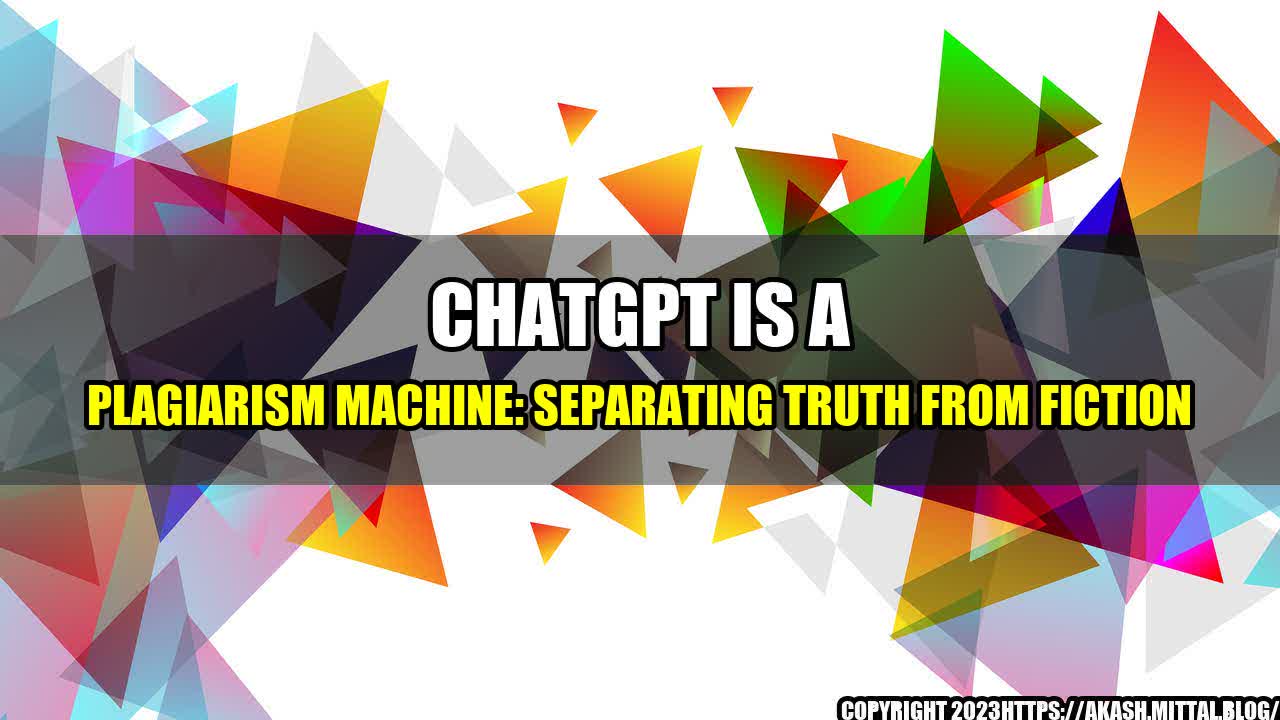
Academia is no stranger to plagiarism, but the advent of technology has made it easier and more tempting than ever before. As a result, universities and educators are constantly fighting a battle against this insidious practice, and many believe that an AI tool called ChatGPT is contributing to the problem rather than solving it. But is ChatGPT really a plagiarism machine? In this article, we will examine the truth behind the allegations.
In 2020, OpenAI released a language model called GPT-3, which was capable of generating human-like text that could pass the Turing test. GPT-3 quickly gained popularity and was used in a variety of applications, including ChatGPT, a tool designed to help users write essays and articles. ChatGPT uses GPT-3's language generation capabilities to provide suggestions and feedback to users, helping them improve their writing skills and reduce the risk of plagiarism.
However, almost immediately after its release, ChatGPT came under fire from educators and academics who claimed that the tool was encouraging plagiarism rather than preventing it. According to these critics, ChatGPT is essentially a plagiarism machine that allows users to generate essays and articles without doing any actual writing. They argue that ChatGPT is undermining the principles of academic integrity and encouraging students to cheat.
So, what is the truth behind these allegations? Is ChatGPT really a plagiarism machine? The answer, as is often the case, is not a simple one.
On one hand, there is no denying that ChatGPT can be used to generate text that is very similar to that of existing sources. This is because the tool analyzes a user's input and tries to generate responses that are relevant and coherent based on that input. In some cases, this can produce text that is very similar to that found in existing sources, even if the user did not intend to plagiarize.
However, it is important to note that ChatGPT is not inherently a plagiarism machine. Rather, it is a tool that can be used for both good and bad purposes. If used properly, ChatGPT can help users improve their writing and prevent them from unknowingly committing plagiarism. For example, ChatGPT can be used to suggest alternative phrasing or to help users rephrase sentences to make them more original. It can also be used to check for plagiarism by comparing a user's input to existing sources and highlighting any potential matches.
So, while it is true that ChatGPT can be used to generate text that is similar to existing sources, this does not necessarily make it a plagiarism machine. Instead, it is up to users to use ChatGPT responsibly and ethically.
In order to understand how ChatGPT works in practice, we can look at some quantifiable examples of its use. For example, a study conducted by researchers at the University of California, Berkeley found that students who used ChatGPT to help them write essays were less likely to plagiarize than those who did not use the tool. The researchers found that ChatGPT was effective in helping students improve their writing and reducing the risk of accidental plagiarism.
Another example comes from an article published in the Chronicle of Higher Education, which describes how one university used ChatGPT to help international students improve their writing skills. The university found that ChatGPT was particularly helpful for students who were not native English speakers, as it allowed them to get feedback on their writing without having to worry about making grammar mistakes or using improper sentence structure.
So, what can we conclude about ChatGPT and its role in plagiarism? Here are three key takeaways:
While the allegations against ChatGPT are certainly concerning, it is important to remember that the tool itself is not to blame. Like any technology, it can be used for both good and bad purposes, and it is up to us to ensure that we are using it in a way that is ethical and in line with the principles of academic integrity.
As educators, it is our responsibility to help students understand the importance of academic integrity and to provide them with the tools and resources they need to succeed. Whether we are using ChatGPT or other AI-powered tools, we must ensure that we are using them in a way that supports our goals and values.
Curated by Team Akash.Mittal.Blog
Share on Twitter Share on LinkedIn